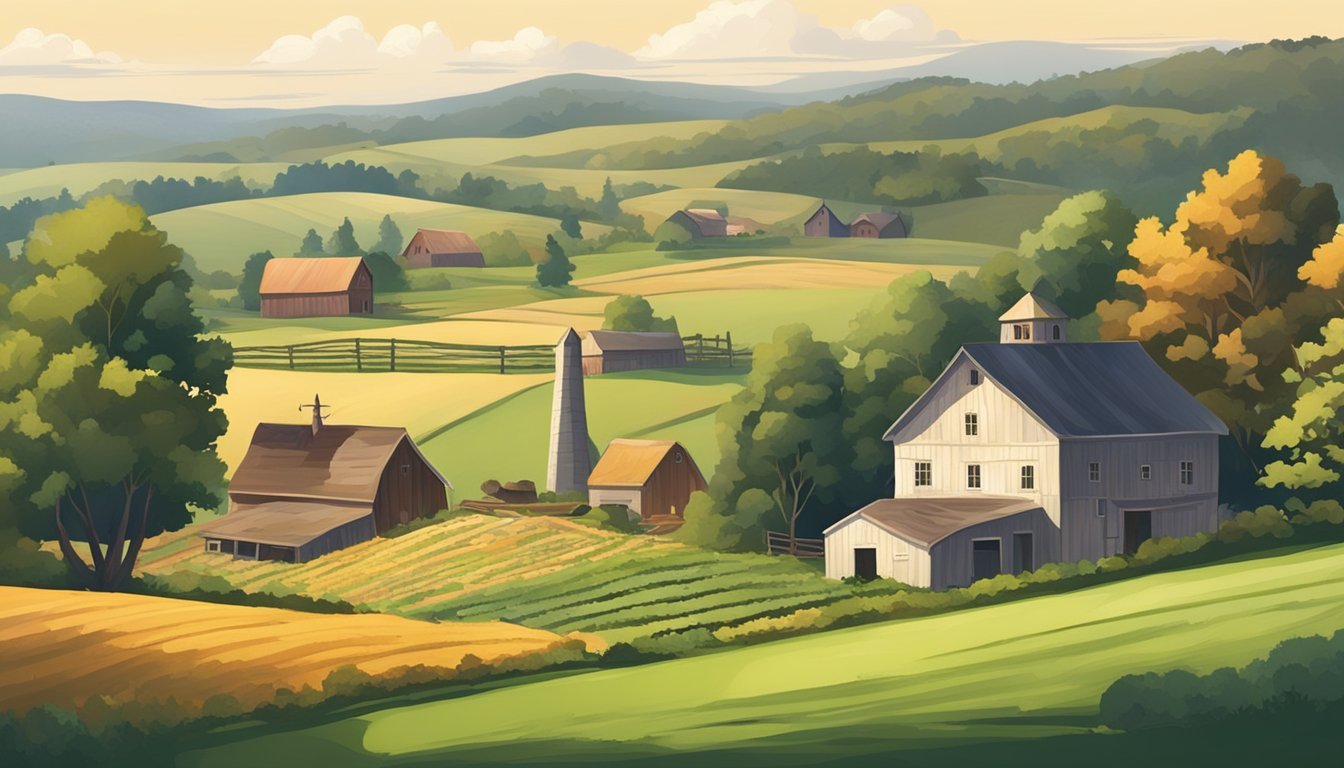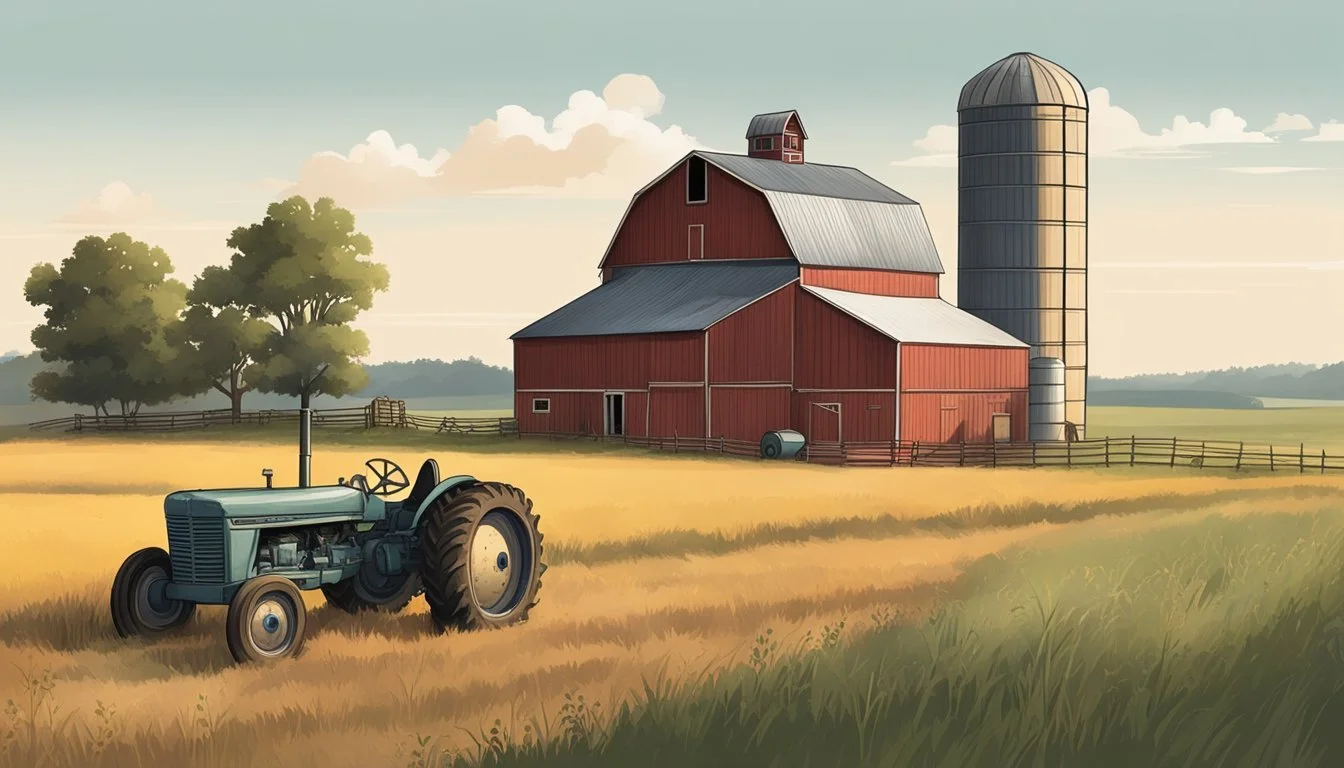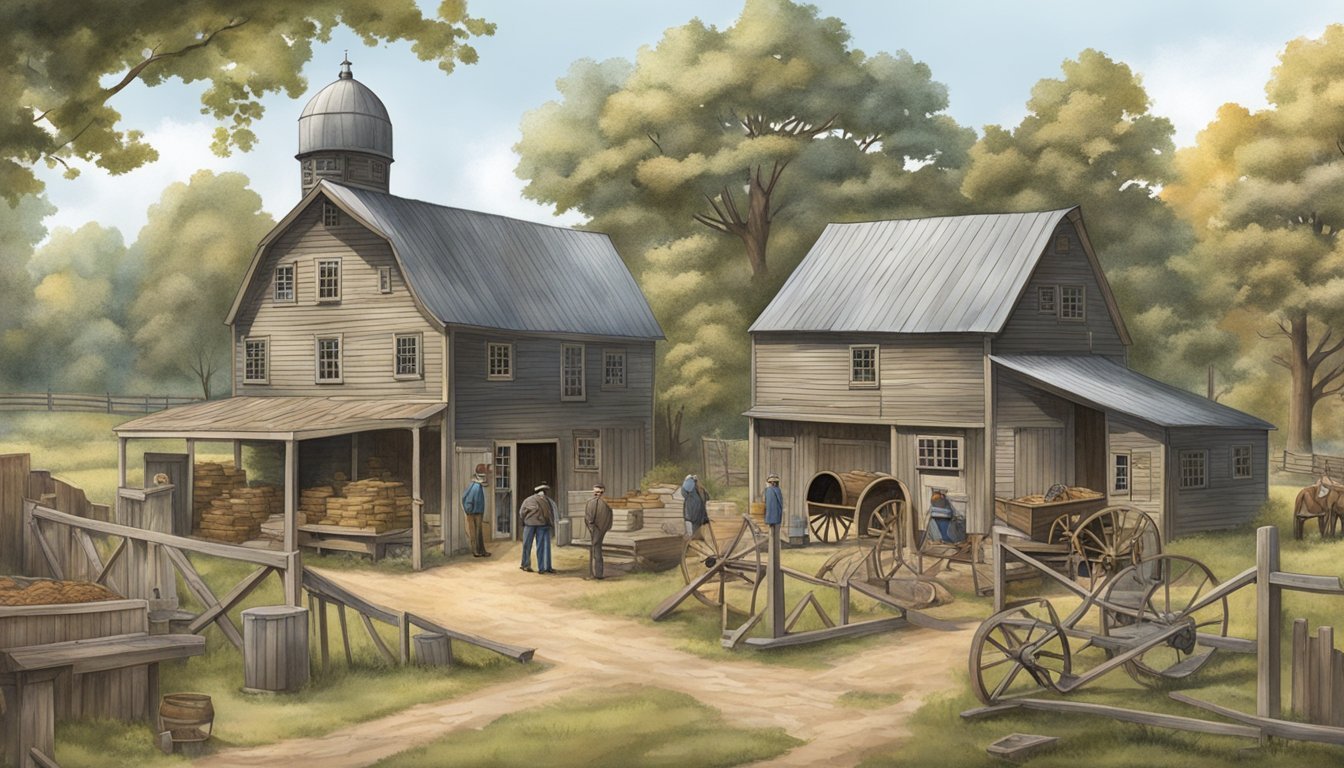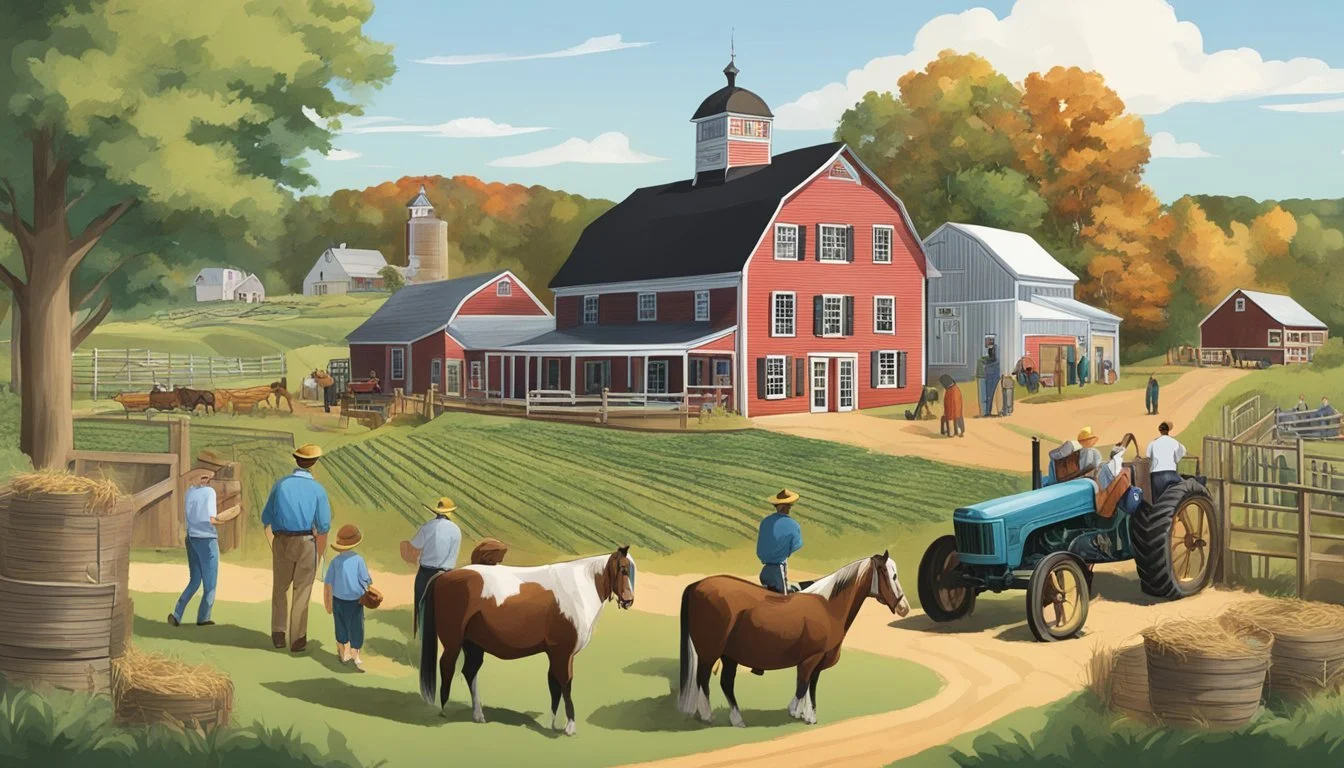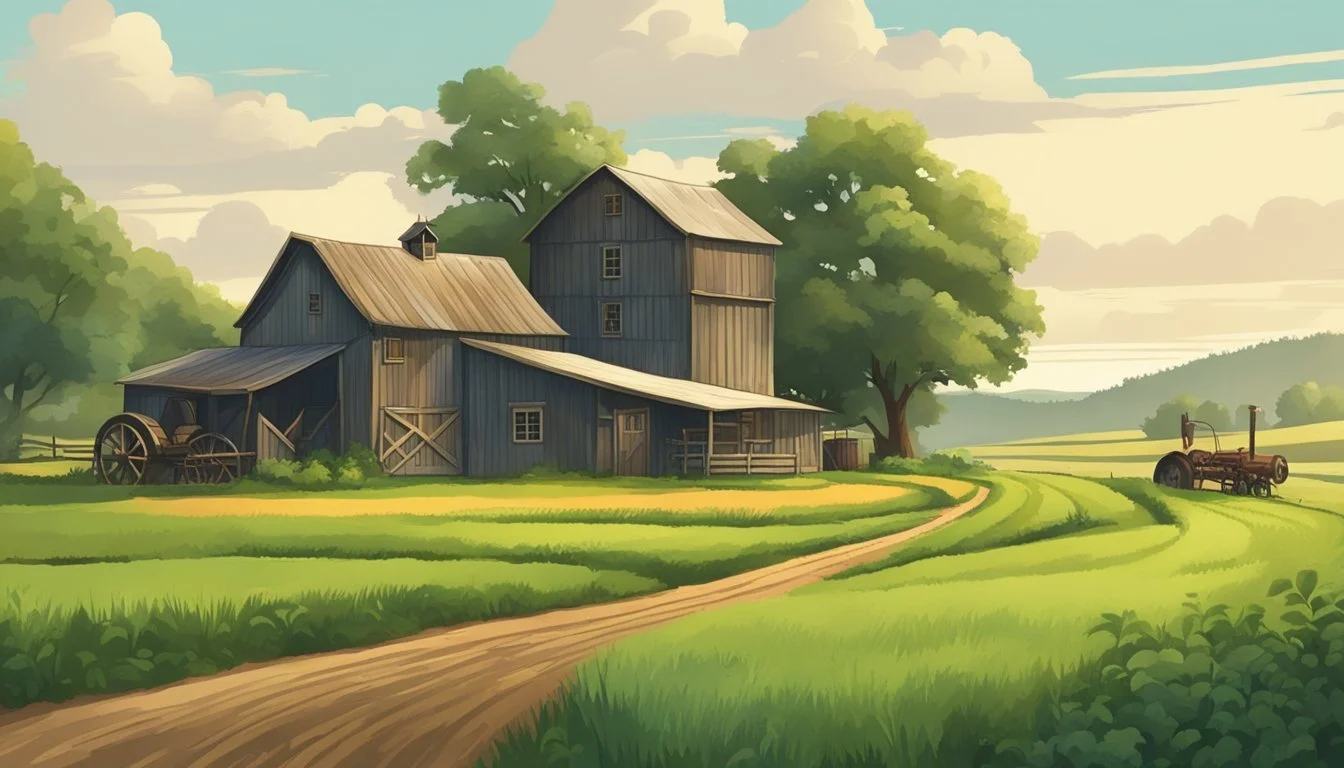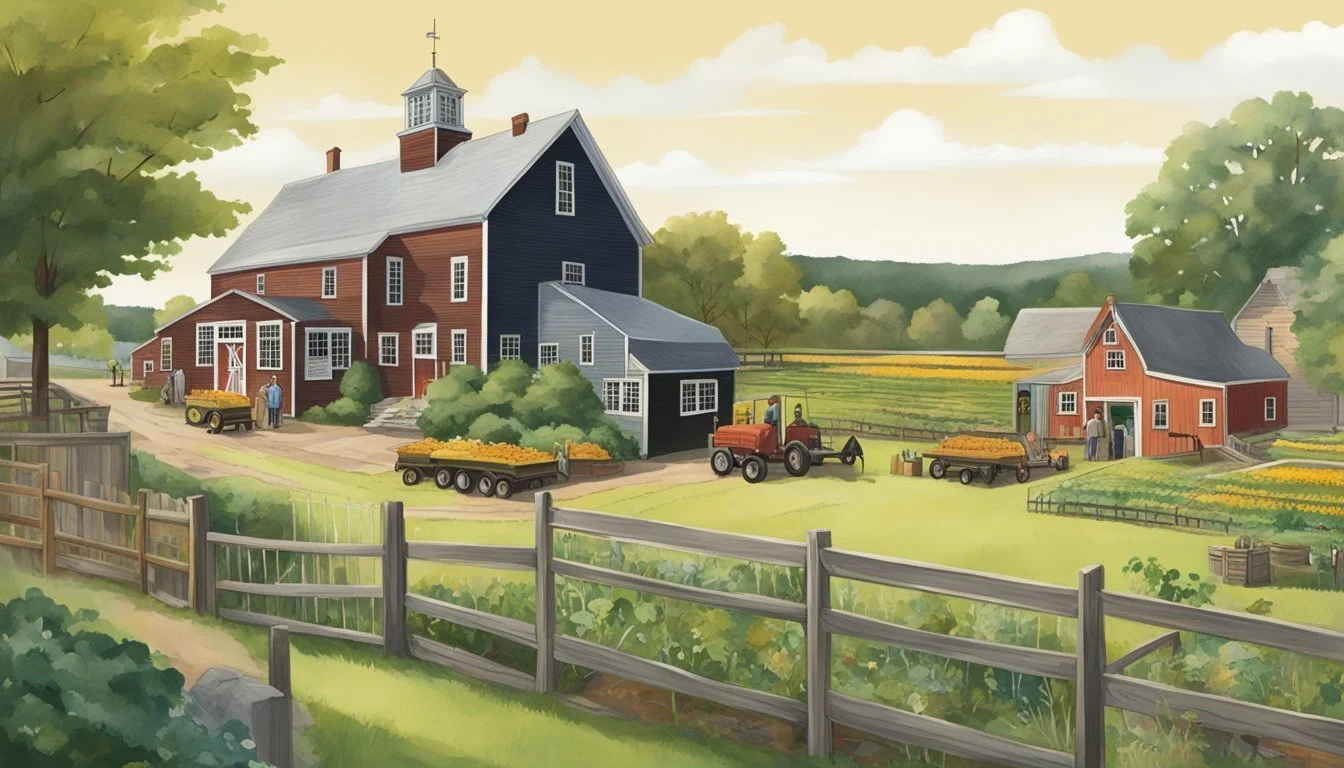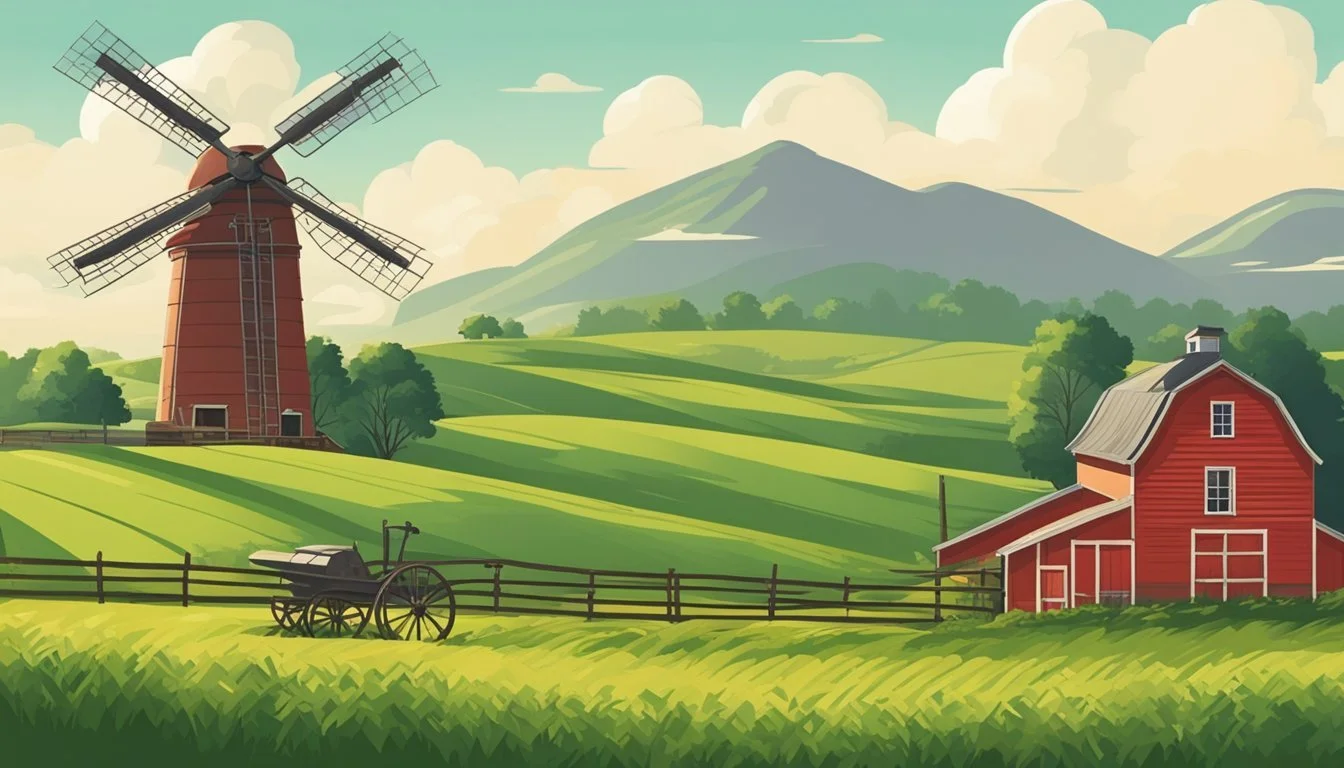Historical Farms and Agricultural Museums in Massachusetts
A Guide to New England's Agrarian Heritage
Massachusetts, a region rich in colonial history and pastoral landscapes, offers a unique window into America's agrarian past through its historical farms and agricultural museums. These institutions preserve and interpret the living heritage of New England’s rural and agricultural life. For instance, Old Sturbridge Village stands as the largest such museum in the region, providing an immersive experience of rural life in the 1830s with detailed reconstructions and engaging, knowledgeable interpreters.
Sites like the Hadley Farm Museum, set in what has been called the most beautiful place on earth, showcase collections that span from the late 1700s to the early 20th century, allowing visitors to glimpse the evolution of agricultural practices and technologies over time. Meanwhile, places like the Brook Farm Historic Site delve into social and intellectual history with its background as a Transcendentalist community and later as a Civil War training camp.
Additionally, the Association for Living History, Farm and Agricultural Museums (ALHFAM), founded in 1970, connects these and other institutions, professionals, and enthusiasts, reinforcing their mission to cultivate and disseminate knowledge about the history and function of these living museums. It helps to ensure that these spaces, which encapsulate the agricultural story of Massachusetts, continue to educate and inspire future generations.
History of Agriculture in Massachusetts
Agriculture has played a significant role in the development of Massachusetts from its earliest colonial days through the transformative Industrial Revolution up to the adoption of modern farming practices today.
Colonial Beginnings
In the 17th century, Massachusetts' agriculture began with the European settlers adapting to native methodologies. They cultivated corn, beans, and squash, learning from the indigenous populations. These crops became staples, leading to the growth of agricultural societies in the 1790s, with a focus on improving farming methods and dissemination of agricultural knowledge.
Industrial Revolution and Agriculture
The Industrial Revolution brought profound changes to Massachusetts, particularly in the early 20th century. While industries thrived, the state saw agricultural communities adapt with mechanization. The Massachusetts Board of Agriculture, established in 1863, was the first of its kind, created to support farmers in these advancements.
Modern Farming Practices
Modern farming in Massachusetts has embraced both innovation and tradition. Institutions like the University of Massachusetts continue to educate in agricultural sciences, bridging its historical roots from Massachusetts Agricultural College. Today, historical farms and agricultural museums, like those promoted by ALHFAM, celebrate this legacy, while Massachusetts farmers employ modern practices to ensure sustainability and productivity.
Famous Historical Farms
Massachusetts has a legacy of preserving its agricultural history through famous historical farms and museums. These locales offer a window into the rural life of early America and celebrate the enduring traditions of farming in the United States.
Old Sturbridge Village
Old Sturbridge Village stands as a prominent outdoor living history museum, depicting a rural New England town of the 1830s. Visitors to the village can experience the functioning of a historical farm including the management of livestock and the cultivation of heirloom plants. Authentic period buildings and staff dressed in era-appropriate attire bring the experience to life, providing insight into the agricultural practices of the time.
Location: Sturbridge, Massachusetts
Established: 1946
Highlights: Working farm with heritage breeds, historical trades, and New England agriculture
Plimoth Plantation
Plimoth Plantation offers a portrayal of life in the 17th century for both the English colonists and the Native Wampanoag people. The farm at Plimoth Plantation is a reconstruction of the early colonial agricultural practices, showcasing historical breeds of animals and heirloom crops. They demonstrate traditional farming techniques, such as plowing by hand and animal power, to educate the public about the agricultural history of America.
Location: Plymouth, Massachusetts
Founded: 1947
Highlights: The 17th-century English Village, Wampanoag Homesite, and the re-created 1627 Pilgrim community
This section offers a glimpse into Old Sturbridge Village and Plimoth Plantation, two iconic establishments that have made significant contributions to preserving and interpreting America's agrarian past.
Living History Museums and Farms
Massachusetts offers a rich tapestry of living history museums and farms providing immersive educational experiences. These institutions enable visitors to witness and participate in historical farming techniques and daily life activities from past centuries.
The Role of Living History in Education
Living history museums play a crucial role in education by allowing people to experience history through active participation and sensory engagement. Visitors can observe demonstrations of period-specific agricultural practices, providing a tangible understanding of historical eras. These interactive experiences often resonate more deeply than traditional classroom learning, creating lasting impressions and a better appreciation of historical contexts.
Major Living History Farms in Massachusetts
Plimoth Patuxet stands as a primary example of a living history site in Massachusetts. This farm showcases the life of 17th-century Pilgrims and Wampanoag people, using accurate replicas of homes and gardens, complete with character interpreters. Visitors can enjoy hands-on activities and explore the nuances of early colonial agriculture.
Old Sturbridge Village is one of the nation’s leading living history farms, depicting rural New England during the 1830s. Here, they can gain insights into historical trades, farming methods, and domestic life. With its authentic buildings, heritage breed animals, and costumed staff, the farm serves a vital role in preserving and sharing agricultural history.
In these settings, living history becomes not only a method of sharing knowledge but also a tool for fostering a deeper connection between modern society and its agricultural heritage.
Agricultural Museums in Massachusetts
Massachusetts boasts a variety of institutions that serve as stewards of the region's agricultural past. These museums play a pivotal role in chronicling the evolution of farming practices and preserving rural heritage.
The Role of Museums in Preserving Agricultural History
Museums dedicated to agriculture are essential in capturing the essence of rural life and the history of farming. They provide tangible insights into the tools, machinery, and methods used in different eras. Through their collections, they ensure that future generations can appreciate the evolution of agricultural practices that have shaped the landscape and livelihoods of Massachusetts.
Key Agricultural Museums in the State
Hadley Farm Museum: Visitors can explore the Hadley Farm Museum, situated in the historic town of Hadley, Massachusetts. This museum is a treasure trove of agricultural artifacts and exhibits that reflect the region's farming history. More information is available on the Hadley Farm Museum website.
Old Sturbridge Village: For a more immersive experience, Old Sturbridge Village offers a window into life in rural Massachusetts during the 1830s. As New England's largest living history museum, it showcases a vibrant collection of New England farming equipment and practices. Learn about their hours and events at Old Sturbridge Village's official website.
ALHFAM: The Association for Living History, Farm and Agricultural Museums provides a network for these institutions, promoting best practices and encouraging the sharing of knowledge and resources among history museums and living history sites.
Fruitlands Museum: The Fruitlands Museum in Harvard, Massachusetts offers a unique look at not only the region's agricultural past but also celebrates native cultures and features a Shaker museum, showcasing a diverse range of historical narratives and collections.
Historical Farm Architecture and Design
The design of historical farms in Massachusetts reflects centuries of functional evolution and the necessity of preservation efforts.
Evolution of Farmhouse Design
Historical farms in Massachusetts showcase a timeline of architectural changes, as each era introduced its own style and function. Initially, these structures were simple and utilitarian, with the focus squarely on practicality. Over time, certain characteristic elements became quintessential, such as large central chimneys to serve as the home's heating core. New England farms often feature the distinctive 'Big House, Little House, Back House, Barn' layout, with buildings interconnected in a way that could combat harsh winters. This design reflects not only architectural innovation but also the social and economic history of the region.
Preservation of Historical Farm Buildings
Preservation efforts are essential in maintaining the integrity of Massachusetts' historic farm buildings. Organizations dedicated to such preservation embrace the challenge of retaining both the physical structure and the spirit of these agricultural edifices. Restoring barns and farmhouses involves careful work to sustain original materials, such as weathered wood and hand-hewn beams, while ensuring the buildings meet contemporary safety standards. It is a delicate balance between honoring the past and securing the future of these historical gems.
Gardens and Farm Landscapes
Massachusetts boasts a rich tapestry of gardens and farm landscapes that encapsulate the state's agricultural legacy, offering visitors a window into historical garden designs and ongoing conservation efforts.
Historical Significance of Garden Designs
The design of historic gardens in Massachusetts reflects a range of aesthetic and functional purposes, shaped by cultural influences and practical needs of the time. The Trustees of Reservations operate numerous properties where these designs are evident, such as the formal gardens of the Crane Estate at Castle Hill. Admired for their beauty and complexity, these designs often include a variety of plant species arranged in patterns that have both ornamental and symbolic meanings. The landscape of Massachusetts is dotted with such creations, from the utilitarian kitchen gardens of early settlers to the grand estate gardens designed for leisure and display.
Conservation and Maintenance of Gardens
Conservation efforts across the state play a critical role in maintaining these historic gardens and farm landscapes. The meticulous work includes restoring plantings, maintaining trail systems, and preserving the landscape's overall integrity. For example, the stunning gardens at Glen Magna Farms are a testament to ongoing dedication to garden conservation, having been awarded for their beauty and historical accuracy, and showcasing the importance of preserving these living exhibits for educational and cultural enrichment. These maintained gardens serve not only as a record of horticultural history but also function as active examples of sustainable gardening practices and landscape stewardship.
Collections and Exhibits
Museums focused on the history of Massachusetts's agriculture preserve the past through extensive collections of artifacts and exhibits. These collections offer a tangible connection to the area's heritage and provide education on historical farming practices.
Documents and Photographs
Historic Beverly boasts a notable collection of archives with a rich assortment of documents and photos. It includes manuscripts, maps, and ephemera that cover comprehensively the Beverly and North Shore's past. The meticulously preserved photography provides a visual journey through the area's history, capturing moments and landscapes from bygone eras.
Agricultural Tools and Equipment
Fruitlands Museum in Harvard, MA, houses an impressive exhibit showcasing historical agricultural tools and equipment. The artifacts displayed here represent the evolution of farming techniques and technology. The collections also include Shaker furnishings that offer insights into the practical and simple design philosophy of the Shaker community, which was deeply intertwined with their agricultural practices.
Educational Programs and Tours
Massachusetts boasts a wealth of historical farms and agricultural museums that offer extensive educational programs and tours. These institutions provide school group visits and guided tours, enhancing the learning experience through hands-on demonstrations and exploration of trails and visitor centers.
School Group Visits
For school groups eager to engage with history, entities like Historic New England offer specialized programs designed to complement and enrich student learning. They tailor experiences to various learning styles, ensuring interactive and dynamic access to history. Programs can be hosted on-site at historical locations or brought directly to the classroom environment, incorporating a multi-disciplinary approach that often includes virtual learning opportunities.
Guided Tours and Interpretation
Visitors seeking a deep dive into rural New England life in the 19th century can explore Old Sturbridge Village. Here, they'll find more than 200 acres and 40 historic buildings. Knowledgeable guides in authentic costumes provide vivid demonstrations and interpret the tasks of the past, allowing for an immersive educational experience. The guided tours at Old Sturbridge Village bring history to life, offering a tangible connection to the early 19th-century agricultural lifestyle.
Through these educational programs and tours across Massachusetts' historical farms and museums, visitors of all ages gain a comprehensive and engaging understanding of the state's rich agricultural past.
Preservation and Conservation Efforts
In Massachusetts, historical farms and agricultural museums benefit from the concerted efforts of various organizations dedicated to preservation and conservation. These entities work tirelessly to maintain the state's rich agricultural heritage for future generations.
Role of Organizations in Preservation
The Massachusetts Department of Agricultural Resources (MDAR) engages in preservation through the Agricultural Preservation Restriction Program (APR). This crucial initiative is designed to purchase development rights to farmland, ensuring lands remain dedicated to agriculture. Such actions prevent urban sprawl and promote sustainable farming practices. Likewise, The Trustees of Reservations, after its 2021 rebranding, champions these efforts further, focusing on the conservation of natural and historical sites across the Commonwealth. The organization has a hand in providing the public with access to various preserved lands, including working farms that serve as living museums of agricultural history.
Volunteer Opportunities
Volunteer contributions are invaluable to the preservation and conservation of historical farms and agricultural museums. The Trustees of Reservations, for instance, invites individuals to partake in activities such as maintaining trails and supporting the day-to-day operations of the farms. Enthusiastic volunteers or those with an interest in history can help with documentation and public education. Opportunities for hands-on involvement give community members the chance to actively participate in conservation efforts while gaining a deeper understanding and appreciation of Massachusetts' agricultural legacy.
Through these combined efforts of organizations and individuals, the backdrop of Massachusetts' storied agricultural past is safeguarded, allowing educational and recreational opportunities for all.
Membership and Community Involvement
Membership in historical farms and agricultural museums offers invaluable benefits to members while bolstering community spirit through various engagements and events.
Benefits of Museum Membership
Members of organizations such as the Association for Living History, Farm and Agricultural Museums (ALHFAM) enjoy a range of benefits. Access to Resources and Networks is a key advantage, as members can connect with professionals and enthusiasts in the field. This includes access to exclusive publications and online resources that provide a wealth of knowledge. Professional Development comes in the form of workshops and conferences where members can build skills and learn about the latest practices in living history and agriculture.
Community Engagement and Events
Community engagement is central to the mission of historical agricultural museums. These institutions frequently organize events that invite community participation and celebrate agricultural history. For example, ALHFAM hosts workshops and conferences that serve as a gathering point for local history buffs and farming communities. These events provide a platform for sharing knowledge, networking, and fostering community involvement in preserving and promoting the region's agricultural heritage.
Supporting Historical Farms and Museums
Historical farms and agricultural museums play a crucial role in preserving Massachusetts' cultural heritage. They rely on public support for conservation efforts and educational programs.
Donating to Conservation and Education
Conservation and education are fundamental to the mission of historical farms and museums. One can support these institutions directly by donating to specific conservation projects or educational programs. Funds generally go towards the restoration of historic structures, procurement of period-appropriate farming tools, and development of interactive exhibits that enhance the learning experience for visitors of all ages. Donations may be monetary, but many museums also welcome the donation of time through volunteer work.
Purchasing Tickets and Merchandise
Supporting historical farms and museums can also be as simple as purchasing tickets for a visit or buying merchandise from their gift shops. Each ticket sale contributes to the daily operations of the museums, which often include the maintenance of buildings and landscapes, as well as the care of animals on living history farms. Merchandise sales, on the other hand, frequently feature artisanal products and historically-inspired items, the proceeds from which are reinvested into museum programs and initiatives. These purchases allow individuals to show their support while receiving tangible reminders of their experience or learning.
Tickets: Regular admission, seasonal events, special tours
Merchandise: Books, replicas, local crafts
Cultural Impact and Significance
Historical farms and agricultural museums in Massachusetts hold a mirror to the cultural and historical fabric of America. They showcase the evolution of agrarian practices and their influence on American identity and cultural heritage.
Farms in the American Identity
Farms are deeply embedded in the American psyche, symbolizing both the pioneering spirit and the agrarian roots of the country. In Massachusetts, the preservation of historical farms offers a window into the early American way of life. Places like the Hatfield Historical Museum underscore the connection between current agricultural practices and those of the past, revealing a continuity of tradition and ingenuity. The commitment to preserving these farms signals their importance in understanding the American narrative.
Museums and National Historic Landmarks
Agricultural museums and estates designated as National Historic Landmarks are important for their role in educating the public and preserving cultural values. These sites often blend the roles of living history and art, such as at Plimoth Plantation, where the recreation of 17th-century farming techniques becomes a form of living art. They serve as touchstones for national pride, allowing individuals to explore and reflect on the substantial role that agriculture and rural life have played in shaping American culture and history.
Visitor Information
When planning a visit to Massachusetts' historical farms and agricultural museums, guests can expect a rich educational experience with a blend of history, culture, and nature. Arrangements and amenities are tailored to ensure a comfortable and accessible outing for all.
Planning Your Visit
Operating Hours: Most historical sites operate seasonally, usually spring through fall. It's advisable for visitors to check online or contact the facilities directly for current opening days and hours before arranging their travel plans.
Tours: Guided tours are often available and provide in-depth insights into Massachusetts’ agricultural past. For instance, one might visit the Association for Living History, Farm and Agricultural Museums website to learn about events and programs on offer.
Admission Fees: Fees may vary across different venues, with some offering free admission and others charging for entrance or tours. Group rates and discounts for seniors, students, or members may be applicable.
Accessibility and Facilities
Visitor Centers: These are typically equipped with essential amenities including restrooms, maps, and information about the site. They might also offer complimentary wheelchairs or strollers for guests with mobility needs.
Trail Accessibility: Outdoor historical sites often have walking trails that allow visitors to explore the premises. Trails are usually clearly marked and range in difficulty. Visitors should inquire ahead about trail accessibility, especially if guests have limited mobility.
Facilities for Guests:
Parking: Ample parking is usually available, with designated accessible spots near the entrance.
Restrooms: Restrooms, including accessible options, are available at visitor centers and key points throughout the sites.
Picnic Areas: Guests can often find picnic tables or areas for rest and refreshments. Some sites might allow guests to bring their own food and beverages.
Visitors are encouraged to wear comfortable footwear and weather-appropriate clothing to enjoy their experience fully. Whether one is exploring the verdant trails or taking a step back in time at historic sites, Massachusetts’ historical farms and agricultural museums offer a unique and memorable journey through the state’s rich agrarian legacy.
Historical Sites and Nearby Attractions
Massachusetts is home to numerous sites steeped in history, offering visitors a chance to step back in time and explore America's rich heritage. These attractions provide a remarkable glimpse into the lives and homes of literary icons and infamous figures from the past.
Lizzie Borden House
The Lizzie Borden House in Fall River stands as a testament to one of the most enigmatic murder cases in American history. Now functioning as a bed and breakfast, the home invites the historically curious to explore its Victorian-era furnishings and encounter the site where the infamous 1892 axe murders occurred. Nearby attractions include the Fall River Historical Society, which showcases local history, including artifacts related to the Borden case.
Emily Dickinson Museum
Situated in Amherst, the Emily Dickinson Museum comprises two historic homes: The Homestead, where the celebrated poet Emily Dickinson was born and lived most of her life, and The Evergreens, the home of her brother, Austin. Offering a deep dive into the world of this literary figure, the museum elucidates her life and work. Guests often extend their visit to other Amherst cultural sites, such as the Amherst History Museum and the Beneski Museum of Natural History.
Greenfield Village
While not located within Massachusetts, Greenfield Village, part of The Henry Ford complex in Michigan, presents an extensive outdoor living history museum where visitors can immerse themselves in the agricultural experiences and historical lifestyles of New England's past. The village includes historical homes like the Noah Webster House, evoking ties to the region's history. Its rich collection of artifacts and working farms provide a deeper understanding of America's developmental era.
These locations are a few of the historical treasures one can explore in and around Massachusetts, each offering a unique portal to America’s agricultural and domestic past.
Notable Figures and Inventors
In the rich tapestry of Massachusetts' agricultural history, certain individuals stand out for their contributions and innovations. From the enduring legacy of historic personalities that shaped societal structures to the inventors whose creations revolutionized farming practices, these figures garner special recognition.
Historic Personalities
The Homesteads of Massachusetts often serve as the backdrop to stories of noteworthy historical figures. These were the domestic spaces where daily life unfolded and history was made. For example, The Alcotts and their Orchard House in Concord embodied the ideals of transcendence and simplicity that underscore the state's agricultural past. Such homesteads often doubled as meeting houses where pivotal figures would gather, exchanging ideas that catalyzed social and agricultural development.
Inventors in Agriculture
In the realm of innovation, Massachusetts' soil was just as fertile for agricultural ingenuity. Pioneering inventors in agriculture found their roots here, devising tools and methods that would transform farming efficiency. One impactful invention was the groundbreaking steel plow, which exponentially increased crop production. The minds behind these innovations are honored not just in the fields, but in museums like the Hadley Farm Museum, which showcases an extensive collection of New England farming equipment from the late 1700s to the early 20th century.
Events and Annual Activities
Massachusetts offers a rich tapestry of events and annual activities celebrating its agricultural heritage. From vibrant festivals highlighting the fall harvest to living history demonstrations at historical farms, there is a wealth of experiences for visitors to enjoy year-round.
Festivals and Fairs
The Big E: One of the most anticipated agricultural events on the eastern seaboard, The Big E features a wide array of food, entertainment, and exhibitors. Spanning over two weeks, visitors can explore New England's agricultural traditions.
Visit during: September 17 - October 3
Massachusetts Sheep and Woolcraft Fair: An event that marks the beginning of the agricultural fair season in the state, attracting enthusiasts with sheep shearing and woolcraft demonstrations.
Visit during: May 25 & 26
Topsfield Fair: Running in early October, the Topsfield Fair is a family-friendly event with a rich history, offering agricultural exhibitions, crafts, and rides.
Visit during: October 4 - 14
Historical Reenactments and Demonstrations
Sturbridge Village: Step back in time at Old Sturbridge Village, where history comes alive with demonstrations of early New England farming techniques and daily activities.
Experience living history at: Old Sturbridge Village
Fruitlands Museum: Not just a museum but also a place of learning, Fruitlands offers harvest events and historical reenactments throughout the year, providing a glimpse into the agricultural practices of the past.
Plan your event at: Fruitlands Museum
Additional Resources and Further Reading
For those seeking to deepen their understanding of Massachusetts' agricultural history, a wealth of information lies within books and online resources. These materials often include historical documents, archival photos, and personal letters that offer a glimpse into the past farming practices and communities.
Books and Publications
Books:
Cultivating Agricultural Education in Amherst gives a detailed account of the transformation from Massachusetts Agricultural College to the University of Massachusetts from 1863 to 1947. It stands as a valuable document for understanding the state’s agricultural education history.
For insight into 19th-century utopian communities and their influential figures, the booklet derived from the historical materials of the Transcendentalists at New Brook Farm provides a narrative on their vision and lifestyle.
Publications:
Historical documents and resources concerning Hadley Farm, a significant historical agricultural site, can be found in the Commonwealth Historical Collaborative.
Online Resources and Databases
Websites:
The Center for Agriculture, Food, and the Environment at UMass offers an array of documents and historical resources which can be accessed through their official website.
Information on the protection and preservation of farmland in Massachusetts can be studied through the Agricultural Preservation Restriction Program detailed on PreservationMA's Barns page.
It should be noted that hours of operation and availability of certain online resources may vary. Researchers and enthusiasts are encouraged to explore these materials to gain a fuller understanding of the state's rich agricultural heritage.

